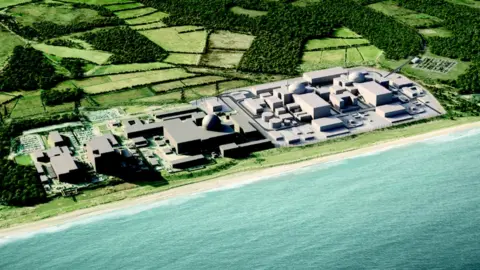New Sizewell power station could add £6 to energy bills
 EDF
EDFEnergy bills could go up by a few pounds a year to pay for a new nuclear power station at Sizewell in Suffolk.
That is if a new financing plan being considered by ministers goes ahead.
It is understood the Department for Business, Energy and Industrial Strategy and the Treasury will shortly issue a consultation document on the new scheme.
Backers of the plan say it would help bring the cost of nuclear power closer to current market rates.
One new nuclear plant is under construction in the UK - EDF is building a pressurised-water reactor at Hinkley Point in Somerset. However, the price of the power it will generate has drawn severe criticism.
The Treasury struck a deal with EDF that means the UK will pay £92.50 per megawatt-hour, roughly twice the current market rate. The price is indexed to inflation, meaning the final number could be much greater.
EDF wants to build another station at Sizewell in Suffolk. Senior sources at the company say it is confident it could bring construction cost down from Hinkley Point's £20bn to about £16bn.
It is also keen to reduce the financing costs by adopting the new financing model, which is already used in regulated monopolies including airports and water companies.
Users pay up front - it has been suggested the Sizewell surcharge could be about £6 on the average annual energy bill - and the developers borrow against that guaranteed stream of income.
Analysts say the financing cost could be reduced from about 9% at Hinkley Point to 4-5% - meaning a much lower cost of power. Industry sources say the final price could be around £60 per megawatt-hour.
Critics of the plan say it shifts risk onto consumers, and point out that the taxpayer will have to pick up the bill if the construction costs turns out to be much greater than predicted.
Theresa May is understood to be considering committing the UK to achieving net zero carbon emissions by 2050, an ambitious goal recently set by the Committee for Climate Change.
